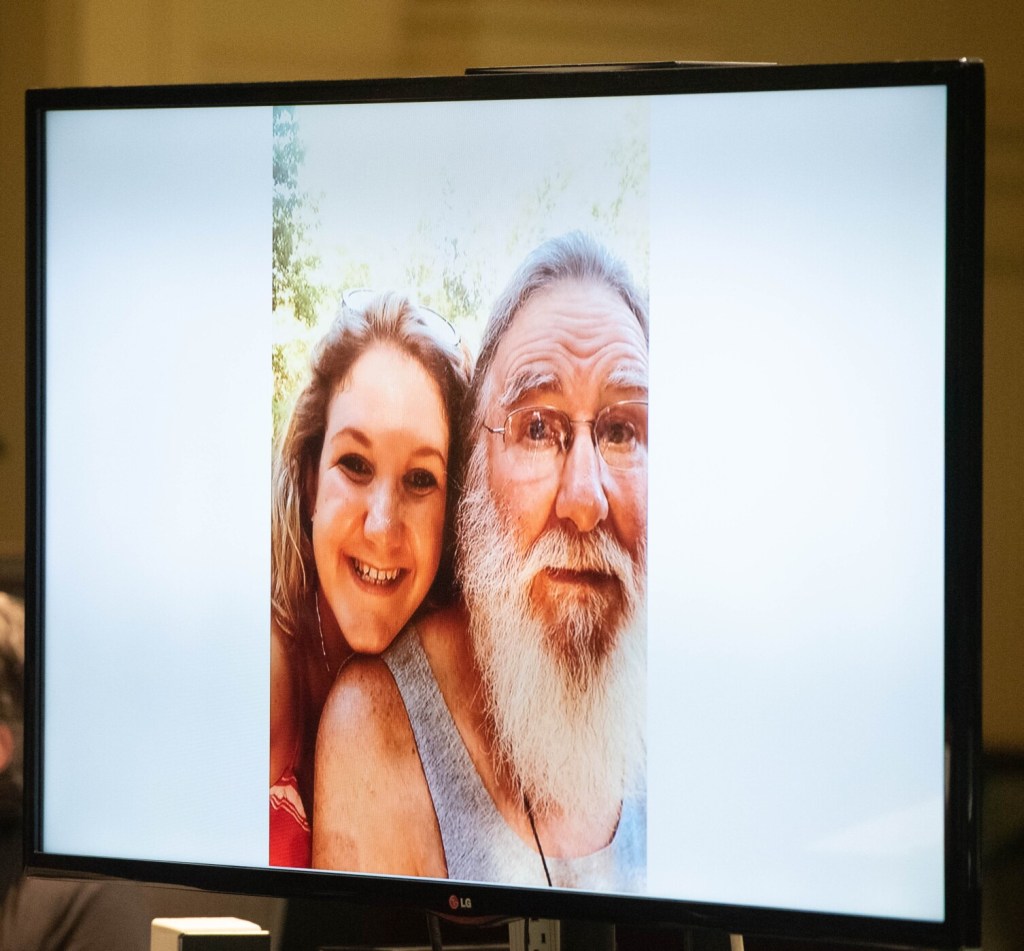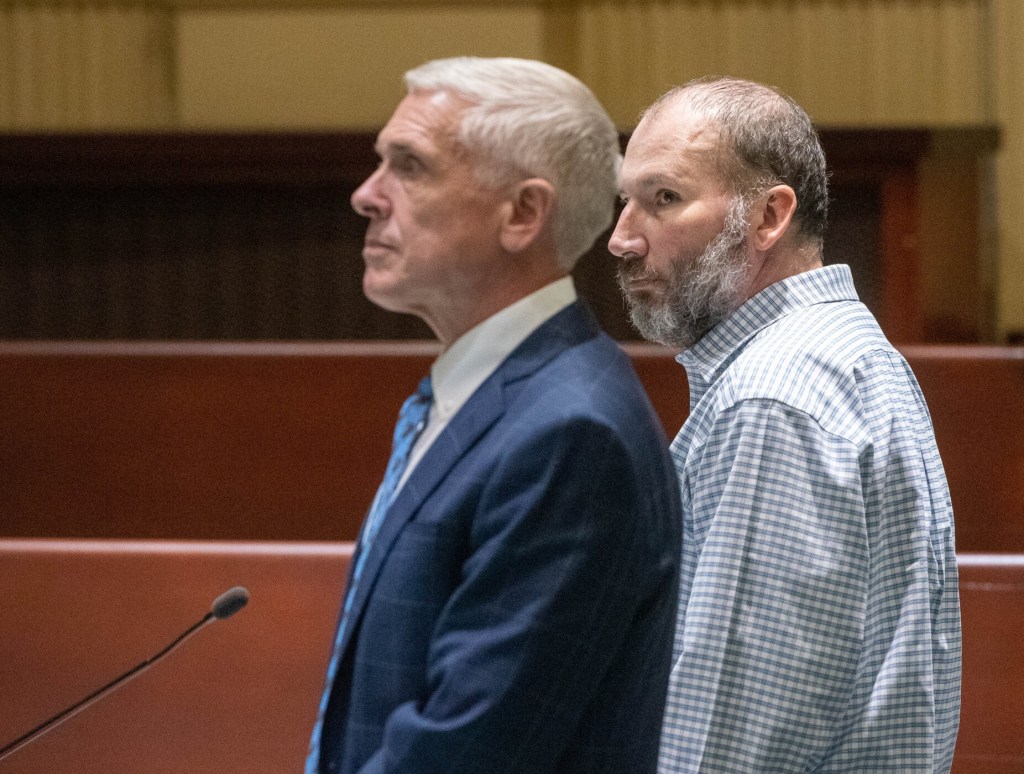AUBURN — The daughter of a man whose body lay decomposing for weeks in the basement of a Lewiston funeral home before that funeral director’s license was suspended and the body was seized by the state is seeking at least $5 million in damages.
Testimony got underway Wednesday at Androscoggin County Superior Court in a civil trial against the owner of Affordable Cremation Solution by Marielle Bischoff-Wurstle. The lawsuit is one of more than a dozen filed last year against the business. This is the first one to go to trial.
Meryl Poulin, a lawyer at a law firm representing a half-dozen clients suing the business, told the jury of seven women and three men Wednesday that the significant emotional toll suffered by her client had been driven by money.
The only one at the funeral home who could process documentation needed for cremations was owner Kenneth Kincer, who had progressively missed more and more work since March of 2020.
After Kincer had stopped coming to work altogether by the beginning of 2021, he had told his two part-time workers they should continue to pick up bodies because “we need the money,” Poulin said.
Bruce Wurstle died May 30, 2021, at Russell Park Rehabilitation and Living Center in Lewiston. His older daughter, Leslie Pike of North Yarmouth, contacted Affordable Cremation Solution, who picked up Wurstle’s body the same day.
She had been told her father’s remains should be ready for her to pick up by the next week.
But after filling out online forms and making repeated phone calls to the funeral home, she had gotten no response, she testified Wednesday.
Finally, on June 9, an agitated man answered the phone and told Pike that none of the bodies at the funeral home had been cremated.
Maine was experiencing a heat wave at the time and Pike imagined what those conditions might due to a corpse.
The man assured her that her father’s body was safely refrigerated and that she needn’t worry.
She told the man she could move her father to a different home, but the worker said, “No, he’ll be safe here.”
On June 16, Pike got a call from a woman at the Office of the Chief Medical Examiner in Augusta, telling her that they believed they had her father’s body in their custody, but would need her to identify it and move it to a funeral home.

A photograph of plaintiff Marielle Bischoff-Wurstle and her father, Bruce Wurstle, is shown Wednesday during opening arguments at the trial of Kenneth Kincer, owner of Affordable Cremation Solution in Lewiston. Wurstle died May 30, 2021, and his body was collected by Affordable Cremation Solution and left unrefridgerated for nearly three weeks as the family was trying to make contact with the business. Andree Kehn/Sun Journal
The woman told Pike that the Lewiston funeral home had been shut down by the state and the funeral director’s license had been suspended.
It had been more than two weeks since her father had died.
Pike couldn’t face the prospect of identifying her father, whose body, like others left in that Lewiston basement, would be difficult to identify due to the likely advanced decomposition that had occurred during the intervening weeks in temperatures nearing 100 degrees.
But it was Pike’s sister, Marielle Bischoff-Wurstle, who suffered the greatest effect of the funeral home’s delays in cremating their father.
Bischoff-Wurstle had learned about the home’s troubles through a TV newscast that described in graphic detail the state of the corpses found there, including the description of a “reddish-brown fluid flowing into the drain in the floor.”
Wurstle’s younger daughter went online to learn about the possible effects of heat on a dead body.
She learned that a decomposing body bloats from the inside out and how muscles, organs and skin begin to liquify before fluids leak from the body.
The “horrifying images” those words evoke “have become Marielle’s final memory of her dad,” Puolin said.
Poulin said the foremost image for Bischoff-Wurstle “of the person that she loved the most is this: is of him rotting in the basement of a funeral home.”
She is expected to testify about the emotional effect the ordeal has had on her, Poulin said.
“She’ll tell you about the recurring nightmare she has where she’s trapped in the basement of Affordable Cremation climbing up a mountain of bodies, looking for her dad but can’t find him,” Poulin said.
She prefers not to think or talk about her dad in an effort to “avoid the gruesome images that it triggers,” Poulin said.
Bischoff-Wurstle “feels ashamed and embarrassed that now all of this is her dad’s story,” Poulin said.
Worse, though, is that she is stuck in a state of grief that she can’t successfully process, Poulin said.
After examining her, a grief and trauma psychiatrist diagnosed her with prolonged grief disorder, the attorney said.
Most people are able to move through their grief and, in time, “make peace with their loss,” Poulin said.
But because of Affordable Cremation’s mishandling of Bischoff-Wurstle’s father’s body just as she was in the beginning stages of the grieving process, she became stuck there, Poulin said.

Kenneth Kincer, right, owner of Affordable Cremation Solution, watches the jury file in Wednesday at the start of a civil lawsuit against him in Androscoggin Superior Court in Auburn. Kincer is accused of letting bodies pile up unrefridgerated in the basement of his Lewiston business in 2021. His lawyer, James Haddow, stands next to him. Andree Kehn/Sun Journal
James Haddow, attorney for Kincer, told the jury Wednesday that he won’t be contesting Poulin’s description of the events that occurred.
“What happened here is not excusable,” he said. “It is not justifiable.”
Kincer opened his funeral home in 2016, and for a number of years “he operated without incident,” Haddow said.
But starting in 2020, “through a variety of circumstances, a confluence of events, gradually and then more precipitously, Affordable Cremation Solution began to fail in fulfilling its responsibility to its clients,” Haddow said.
By the end of May 2021, Kincer had stopped functioning in his role at the funeral home of overseeing the process of having the bodies cremated, a role only he was licensed to perform.
“It is absolutely the case,” Haddow said, that what Affordable Cremation Solution did and failed to do when Bruce Wurstle was in their custody caused additional emotion distress to Bischoff-Wurstle.
The jury’s job will be to separate the emotional distress Bischoff-Wurstle experienced due to the death of her father from the added emotional toll she endured because of Affordable Cremation Solution.
Haddow acknowledged that won’t be an easy task.
The legal standard burden of proof in a civil trial a preponderance of the evidence, two-thirds of the jurors must agree on compensatory damages.
The trial is likely to wrap up by the end of the week.
Send questions/comments to the editors.







